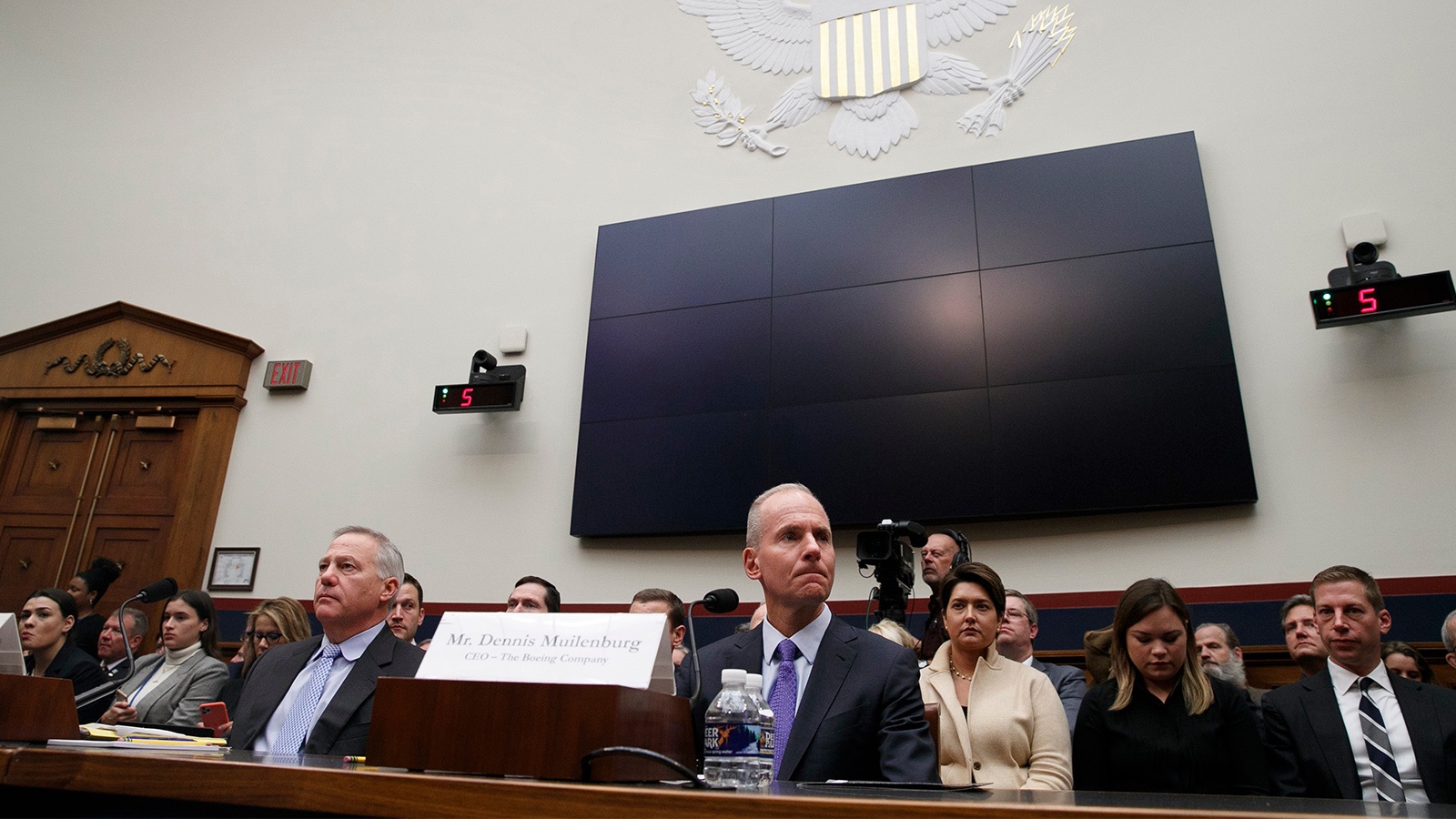
Stay Up to Date
Submit your email address to receive the latest industry and Aerospace America news.

Boeing chief plans to stay as lawmakers press for more accountability
Boeing President and CEO Dennis Muilenburg faced his sharpest criticism yet Wednesday over decisions made at Boeing in the design and certification of the 737 MAX jets.
“You have a systemic problem in your company,” Rep. John Garamendi, D-Calif., told Muilenburg during a hearing of the House Transportation Committee. “I would posit that you are pushing profit over quality and safety.”
Muilenburg shot back: “I disagree with your premise. Our business model is safe airplanes. That’s the only sustainable business model for Boeing.”
As for whether Muilenburg’s tenure is at risk, he told Rep. Paul Mitchell, R-Mich., that he planned to stay on.
“These two accidents happened on my watch. I feel responsible to see this through,” Muilenburg said.
This was Muilenburg’s second congressional appearance since the Lion Air and Ethiopian Airlines crashes that killed 346 people and prompted a worldwide grounding of the MAX. Boeing expects the MAX to fly again before the end of the year, but before that happens the FAA must recertify the anti-stall software implicated in both crashes, the Maneuvering Characteristics Augmentation System, or MCAS.
In a now-infamous decision, Boeing elected to tie MCAS to just one of the jet’s two angle-of-attack sensors, the metal vanes on each side of the fuselage that measure the position of the plane relative to the air flow. Local investigators concluded that in each crash, MCAS erroneously pushed the nose downward because of faulty readings from this single AoA sensor.
Boeing employees had flagged this vulnerability before the MAX was certified in 2017, noted committee chairman Rep. Peter DeFazio, D-Ore. On screens in the hearing room, he displayed an email from a Boeing engineer dated December 2015 that read:
“Are we vulnerable to single AOA sensor failures with the MCAS implementation or is there some checking that occurs?”
Muilenburg said if Boeing “knew everything we know now, we would’ve made different decisions.” Going forward, MCAS will only activate if it receives the same readings from both AoA sensors, Muilenburg said, reiterating a statement released by Boeing after the second MAX crash.
Muilenburg denied that Boeing has not held itself accountable for decisions that contributed to the crashes.
“I am accountable. My company is accountable,” Muilenburg said under questioning from Rep. Rick Larsen, D-Wash., whose district is not far from the facility where Boeing assembles the MAX jets.
Muilenburg pointed to “organizational and structural” changes within the company, including his demotion from chairman of Boeing’s board of directors earlier this month. As chairman, Muilenburg ran board meetings and oversaw discussions with Boeing shareholders; he will now “focus full time on running the company” as it works to recertify the MAX, Boeing said in a press release.
On accountability, Larsen said: “I’m not convinced in reading these [investigation] reports and seeing Boeing’s own actions that that’s being done adequately.”
Boeing wasn’t the only entity in the committee’s crosshairs. As the MAX grounding stretches on, Congress is now considering an overhaul of the FAA certification process that first cleared the aircraft for commercial flights, a topic that dominated Muilenburg’s Tuesday appearance before the Senate Commerce Committee. Under a program called the Organization Designation Authority, or ODA, the FAA streamlines certification by delegating authority to employees at companies like Boeing to sign off on certain aspects of the aircraft.
FAA “retains the ultimate responsibility for ensuring compliance with all safety regulations,” said Rep. Sam Graves, R-Mo., the top Republican on the committee. “If these investigations reveal problems with certification, then I think Congress should act to fix those specific and identifiable problems,” he added.
“Something went wrong in the certification process of this plane,” said Rep. Dan Lipinski, D-Ill. “Either the FAA certification process itself is at fault, Boeing is at fault in their role in the process, or both.”
About cat hofacker
Cat helps guide our coverage and keeps production of the print magazine on schedule. She became associate editor in 2021 after two years as our staff reporter. Cat joined us in 2019 after covering the 2018 congressional midterm elections as an intern for USA Today.
Related Posts
Stay Up to Date
Submit your email address to receive the latest industry and Aerospace America news.



